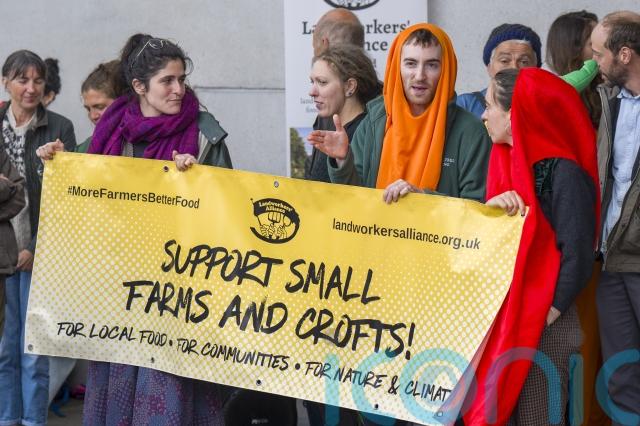
An independent expert has said Scotland’s proposed Good Food Nation plan has “big gaps around some of the big issues” in Scotland’s food supply chain.
Vicki Swales, head of land use policy at the RSPB, spoke at a Rural Affairs and Islands Committee in the Scottish Parliament on Wednesday, which had a focus on Scotland’s proposed Good Food Nation plan.
She said of the plan: “It talks about things like greenhouse gas emissions, food insecurity, and those diet related illnesses. But there’s some quite big gaps around some of the big issues that need to be addressed.
“Members feel that there’s insufficient content around the food environment. No indicators related to food deserts, concentration of takeaways paired with population, or fast food ads in physical and digital spaces.
“There’s no mention of trying to track worker safety in sea and on land for example, which would be a good thing. We know that those industries have particular issues. There’s a vast array of challenges to be addressed across the food system, and the plan starts to talk about some of them, but it’s quite silent on some of them or setting indicators around them.”
Scotland’s Good Food Nation Plan was mandated by the Good Food Nation (Scotland) Act 2022.
It is a strategic policy framework designed to create a fairer, healthier, and more sustainable food system in Scotland by integrating policies across government.

It aims to address interconnected food-related issues which could include public health and diet-related inequalities and supporting the food and drink industry.
Ms Swales also responded to concerns over contradictions and challenges involving delivering for nature and climate and food production.
She said: “Foundational to producing our food is having healthy nature and a healthy climate and there are many farmers out there who are doing that already and we acknowledge that.
“Having said that, we need an honest appraisal of what the reality is in the current situation – and that is that nature is declining and in many cases that is linked to agricultural practice.
“Some of that is historic, some of that ongoing, and agriculture is the third largest source of greenhouse gas emissions in Scotland.”
Lisa Hislop-Smith, supply chain policy manager at the National Farmers Union Scotland, also agreed the plan failed to join the policy together in the proposals made.
She shared concerns on the plans’ proposals for farming, saying: “The outcomes are broad, they’re ambitious. They cover a huge range of the ambition of the plan which has to be welcomed.
“That being said, we generally do feel that the plan misses the key element of: how do we turn this element into action? What support will be available for farmers, crofters, and the food and drink businesses, to turn it into something tangible?
“We really hoped the plan would provide that detail and currently it’s still quite ambiguous.”
Ms Hislop-Smith also responded to concerns about animal welfare and environmental concerns around agriculture as a section of the plan refers to maintaining such standards.
She said: “I think there is no contradiction between food production, climate adaptation, mitigation and nature restoration.
“The discussion around it has definitely evolved. Our members, farmers and crofters across Scotland care deeply as stewards of the land.
“We’re already incredibly regulated in terms of animal health and welfare and our current standards of productions are and have been championed and regulated.”
Following the session, the committee will write to the Cabinet Secretary to highlight the official report detailing the issues raised during the discussion.
It is intended that this will feed into the Scottish Government’s deliberations ahead of finalising the plan.
It comes as farmers and agricultural workers held a demonstration outside the Scottish Parliament on Wednesday.
The Scottish Agroecology Partnership (SAP), a newly founded group consisting of several farming and agricultural organisations, called upon the Scottish Government for a fair and just transition for small and medium-sized agricultural businesses.

They called for the majority of publicly-funded subsidies to go to farmers that are beneficial to the environment, better incomes for farmers and crofters, to invest more spending in organic food sources, and to introduce targeted funding for small-scale fruit and veg growers who are currently excluded from governmental funding.
Additionally, they asked for the integration of low-density trees on Scottish farms to enhance biodiversity.
They asked for the Scottish Government to strengthen local food supply chains through better infrastructure, and called for support for training for farmers of all career stages.
Keynote speaker Tara Wight, who is Scotland policy and campaigns coordinator for the Landworkers’ Alliance, said: “We’ve heard so much governmental rhetoric about just transition and what we’re getting in our rural support system is basically more of exactly the same, we’re not seeing justice, or transition.
“The budget is almost all going to keep going to the biggest, wealthiest land owners, while small-scale and medium scale family farms are really struggling to make ends meet and aren’t able to take the risks often that are involved in transitioning to more sustainable and regenerative practises.”
Subscribe or register today to discover more from DonegalLive.ie
Buy the e-paper of the Donegal Democrat, Donegal People's Press, Donegal Post and Inish Times here for instant access to Donegal's premier news titles.
Keep up with the latest news from Donegal with our daily newsletter featuring the most important stories of the day delivered to your inbox every evening at 5pm.